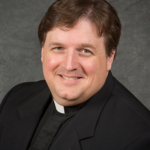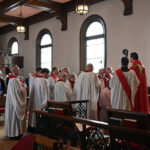This website uses cookies so that we can provide you with the best user experience possible. Cookie information is stored in your browser and performs functions such as recognising you when you return to our website and helping our team to understand which sections of the website you find most interesting and useful.
by the Rev. Jeffrey Ross
By virtue of our baptism, all Christians are called to ministry. For some, this takes the form of work in a particular area, such as teaching children or working with the hungry. For others, this may manifest in helping the elderly do their taxes or working as a chaplain to a family in the hospital. We are all gifted by the Holy Spirit for ministry and each of us is called to serve in our own unique way.
The Catechism in the 1979 Book of Common Prayer makes it clear that every baptized person, whether lay or ordained, employed or volunteer is a minister. We each have a duty “to work, pray, and give for the spread of the kingdom of God” (pgs. 855–856).
Living out this duty is called one’s vocation. This word comes from the Latin word, vocare which means to call. The Holy Spirit calls every one of us to use the gifts we have been given in service to God by serving others. Each vocation is as unique as the individual. In his book, Wishful Thinking, the great theologian Frederick Buechner wrote that: “The place God calls you to is the place where your deep gladness and the world’s deep hunger meet.”
How does one hear the Spirit’s call? Sometimes a vocation evolves quite naturally in the course of one’s life. We may enjoy singing or playing music and embrace opportunities to share this gift with others by becoming a pastoral musician. At times, the Spirit calls in particular situations and through experiences, such as encountering a homeless person and being drawn to care for them and others by working at a shelter. Living out a vocation is more than just an occasional experience; it becomes not just something we are drawn to, but something that becomes integrated into our whole life.
The process of finding our vocation and answering God’s call is called discernment. Discernment is a lifelong process of hearing and responding to God’s call to serve. We discern first by listening for how God is speaking in our lives and by noticing our internal affective movements — that is what moves or draws us. Sometimes this call comes easily, even suddenly and obviously. Other times it takes time for us to listen, notice, and reflect. As we see in the Hebrew Scriptures, sometimes we are called with clarity, like the prophet Jeremiah, while at other times we might struggle to accept God’s call and go to great lengths to avoid it, like the prophet Jonah.
A friend of mine likes to tell the story of a farmer who looked up in the sky one day and thought he saw a sign from God. Very clearly, the only two clouds in the sky that day formed the letters “P” and “C”. The farmer was convinced this was a sign that God was calling him to leave farming and to take up the ordained ministry to “Preach Christ.” What else could clouds forming P and C mean? He sold his farm, enrolled in seminary and began to seek ordination in the church. Sadly, he barely passed all of his courses. His sermons were not well received, and he seemed to have great difficulty being pastorally present to those he encountered in his field education internships and clinical pastoral education experiences at the hospital. Finally, he went to meet with the bishop about his vocation. The bishop expressed concerns about the seminarian’s struggles academically and pastorally, but the farmer persisted in his certainty that this was precisely where he was supposed to be and to what God was calling him. The bishop asked him to share the reason for his discernment and the farmer told him about the clouds he saw in the sky. The bishop thought for a few moments and then looked gently into the farmer’s eyes and asked, “Did you ever consider that maybe God was encouraging you to plant corn?”
Discernment is never a solo journey made alone. While it begins with God, the source of all good, it is affirmed by the community, which is the people of God. In moving through discernment, it can be very helpful to be connected to a soul friend or spiritual director who prays with us and for us, and who gently helps us to notice how God is moving in our lives. If we are truly called to a ministry of service to a faith community, then that vocation will be affirmed by the community. God not only calls individuals to serve, but also calls communities to receive the gifts of those God calls to ministry.
Discerning one’s vocation is sacred. When Moses was drawn to the burning bush, he was led into a conversation with God in which he heard the call to serve God’s people in bondage in Egypt. He was told to remove his shoes, for he was standing on holy ground. Answering a call and living out a vocation is intimate and close to each one of our hearts. It is sacred. Spiritual directors and clergy who work with those in discernment need to recognize the same and act with great care and humility in helping others discern the movement of the Holy Spirit.
In the Episcopal Church, each diocese is responsible for forming a Commission on Ministry (COM) to support all Christians in living out their vocation as the baptized. This group collaborates with the bishop to raise up those who are called to particular a ministry in the community, both lay and ordained. The commission also offers support and guidance in the discernment process. Here in Delaware, we have established a partnership with the Stevenson School in Pennsylvania to provide distance learning for those seeking to be licensed as a lay worship leader and/or preacher. They will also be working with those seeking ordination as vocational deacons. The COM also works with those called to the ordained priesthood.
If you have felt the Holy Spirit tugging at your heart and wondered about God’s call in your life, I encourage you to speak with the clergyperson who serves your congregation. Perhaps you might also want to establish a relationship with a spiritual director. If the Commission on Ministry or I can be of any help to you, please feel free to reach out to me at com@delaware.church. As you begin this journey, I commend to you this prayer for discernment penned by Thomas Merton:
O Lord God, I have no idea where I am going, I do not see the road ahead of me, I cannot know for certain where it will end. Nor do I really know myself. And that fact that I think I am following Your will does not mean that I am actually doing so. But I believe that the desire to please You does in fact please You. And I hope I have that desire in all that I am doing. I hope that I will never do anything apart from that desire to please You. And I know that if I do this You will lead me by the right road, though I may know nothing about it. Therefore, I will trust You always though I may seem to be lost and in the shadow of death. I will not fear, For You are ever with me, and You will never leave me to make my journey alone. Amen.

The Rev. Jeffrey Ross has served as the rector of St. Peter’s Episcopal Church in Lewes since August 2005. Ross is also the chairperson of the diocesan Commission on Ministry. jross@stpeterslewes.org





